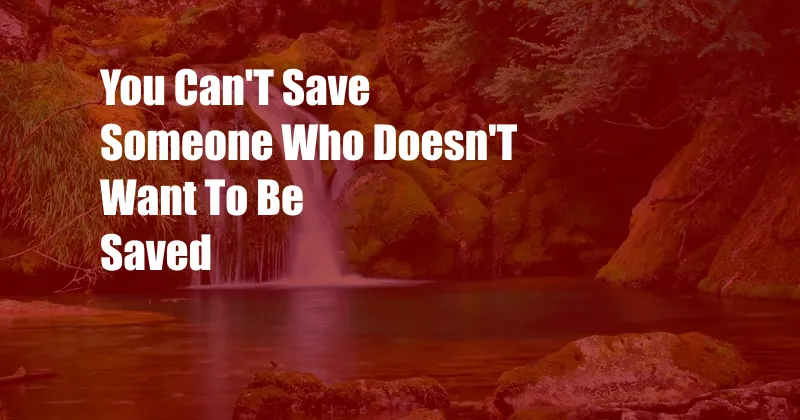
You Can’t Save Someone Who Doesn’t Want to Be Saved
I was 16 years old when I first met Emily. She was a friend of a friend, and we quickly bonded over our shared love of music and our equally sarcastic sense of humor. Emily was always the life of the party, the one who could make everyone laugh. But beneath her bubbly exterior, I could sense a deep sadness.
As we got to know each other better, Emily confided in me about her struggles with depression and anxiety. She had been self-harming for years, and she had even attempted suicide once before. I tried to be there for her, to listen to her and offer my support. But no matter what I said or did, I couldn’t seem to reach her. It was like she was trapped in a dark place, and no one could pull her out.
The Hard Truth
The truth is, you can’t save someone who doesn’t want to be saved. No matter how much you love them, no matter how much you care, you can’t force them to get help. They have to want it for themselves.
This is a difficult lesson to learn, and it can be incredibly painful to watch someone you love struggle with self-destructive behavior. But it’s important to remember that you are not responsible for their choices. You can’t make them get help if they don’t want it. All you can do is be there for them, offer your support, and let them know that you love them.
What You Can Do
If someone you love is struggling with self-destructive behavior, there are a few things you can do to help them:
- Be there for them. Let them know that you love them and that you care about them. Listen to them without judgment and offer your support.
- Encourage them to get help. Talk to them about the benefits of therapy and medication. Help them find a therapist or doctor who can help them.
- Respect their decision. If they don’t want to get help, you have to respect their decision. You can’t force them to do something they don’t want to do.
It’s also important to take care of yourself. Supporting someone who is struggling with self-destructive behavior can be emotionally draining. Make sure to take breaks and talk to someone you trust about how you’re feeling.
FAQ
Q: What if someone I love is in immediate danger?
A: If someone you love is in immediate danger, call 911 or take them to the emergency room.
Q: What if someone I love refuses to get help?
A: If someone you love refuses to get help, you can’t force them. All you can do is be there for them and offer your support. Let them know that you love them and that you’re there for them if they ever change their mind.
Conclusion
Watching someone you love struggle with self-destructive behavior is one of the most difficult things you can go through. But it’s important to remember that you are not alone. There are people who care about you and want to help. And most importantly, there is hope. With the right help, your loved one can recover and live a happy and healthy life.
Do you have any questions about self-destructive behavior? Please feel free to leave a comment below and I’ll do my best to answer them.